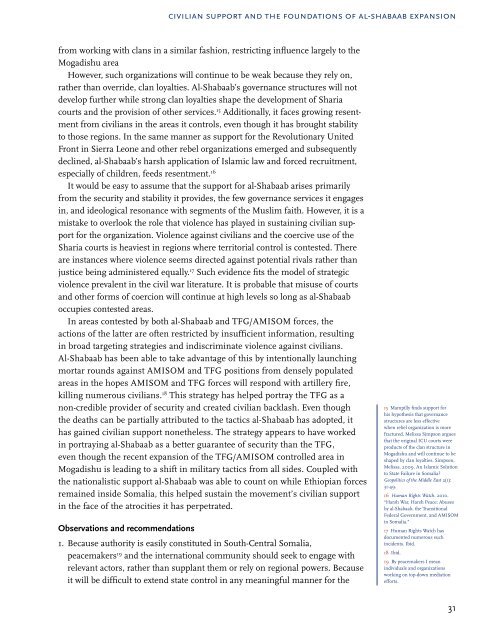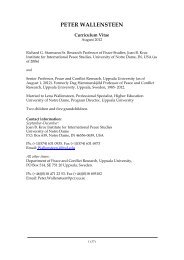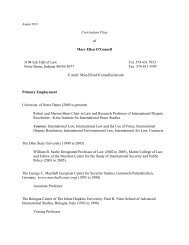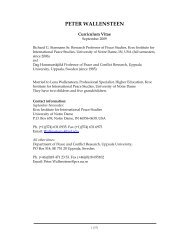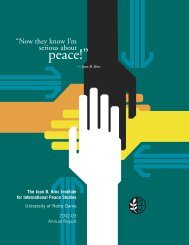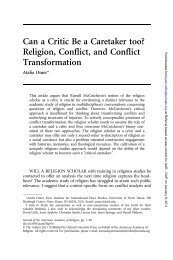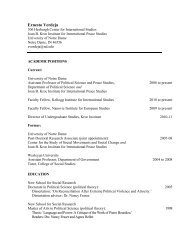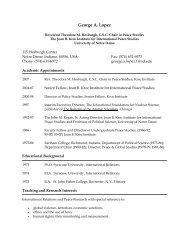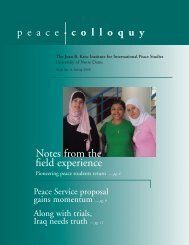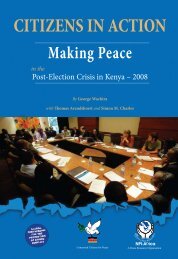Somalia: Creating Space for Fresh Approaches to Peacebuilding
Somalia: Creating Space for Fresh Approaches to Peacebuilding
Somalia: Creating Space for Fresh Approaches to Peacebuilding
Create successful ePaper yourself
Turn your PDF publications into a flip-book with our unique Google optimized e-Paper software.
civilian support and the foundations of al-shabaab expansion<br />
from working with clans in a similar fashion, restricting influence largely <strong>to</strong> the<br />
Mogadishu area<br />
However, such organizations will continue <strong>to</strong> be weak because they rely on,<br />
rather than override, clan loyalties. Al-Shabaab’s governance structures will not<br />
develop further while strong clan loyalties shape the development of Sharia<br />
courts and the provision of other services. 15 Additionally, it faces growing resentment<br />
from civilians in the areas it controls, even though it has brought stability<br />
<strong>to</strong> those regions. In the same manner as support <strong>for</strong> the Revolutionary United<br />
Front in Sierra Leone and other rebel organizations emerged and subsequently<br />
declined, al-Shabaab’s harsh application of Islamic law and <strong>for</strong>ced recruitment,<br />
especially of children, feeds resentment. 16<br />
It would be easy <strong>to</strong> assume that the support <strong>for</strong> al-Shabaab arises primarily<br />
from the security and stability it provides, the few governance services it engages<br />
in, and ideological resonance with segments of the Muslim faith. However, it is a<br />
mistake <strong>to</strong> overlook the role that violence has played in sustaining civilian support<br />
<strong>for</strong> the organization. Violence against civilians and the coercive use of the<br />
Sharia courts is heaviest in regions where terri<strong>to</strong>rial control is contested. There<br />
are instances where violence seems directed against potential rivals rather than<br />
justice being administered equally. 17 Such evidence fits the model of strategic<br />
violence prevalent in the civil war literature. It is probable that misuse of courts<br />
and other <strong>for</strong>ms of coercion will continue at high levels so long as al-Shabaab<br />
occupies contested areas.<br />
In areas contested by both al-Shabaab and TFG/AMISOM <strong>for</strong>ces, the<br />
actions of the latter are often restricted by insufficient in<strong>for</strong>mation, resulting<br />
in broad targeting strategies and indiscriminate violence against civilians.<br />
Al-Shabaab has been able <strong>to</strong> take advantage of this by intentionally launching<br />
mortar rounds against AMISOM and TFG positions from densely populated<br />
areas in the hopes AMISOM and TFG <strong>for</strong>ces will respond with artillery fire,<br />
killing numerous civilians. 18 This strategy has helped portray the TFG as a<br />
non-credible provider of security and created civilian backlash. Even though<br />
the deaths can be partially attributed <strong>to</strong> the tactics al-Shabaab has adopted, it<br />
has gained civilian support nonetheless. The strategy appears <strong>to</strong> have worked<br />
in portraying al-Shabaab as a better guarantee of security than the TFG,<br />
even though the recent expansion of the TFG/AMISOM controlled area in<br />
Mogadishu is leading <strong>to</strong> a shift in military tactics from all sides. Coupled with<br />
the nationalistic support al-Shabaab was able <strong>to</strong> count on while Ethiopian <strong>for</strong>ces<br />
remained inside <strong>Somalia</strong>, this helped sustain the movement’s civilian support<br />
in the face of the atrocities it has perpetrated.<br />
Observations and recommendations<br />
1. Because authority is easily constituted in South-Central <strong>Somalia</strong>,<br />
peacemakers19 and the international community should seek <strong>to</strong> engage with<br />
relevant ac<strong>to</strong>rs, rather than supplant them or rely on regional powers. Because<br />
it will be difficult <strong>to</strong> extend state control in any meaningful manner <strong>for</strong> the<br />
15 Mampilly finds support <strong>for</strong><br />
his hypothesis that governance<br />
structures are less effective<br />
when rebel organization is more<br />
fractured. Melissa Simpson argues<br />
that the original ICU courts were<br />
products of the clan structure in<br />
Mogadishu and will continue <strong>to</strong> be<br />
shaped by clan loyalties. Simpson,<br />
Melissa. 2009. An Islamic Solution<br />
<strong>to</strong> State Failure in <strong>Somalia</strong>?<br />
Geopolitics of the Middle East 2(1):<br />
31-49.<br />
16 Human Rights Watch. 2010.<br />
“Harsh War, Harsh Peace: Abuses<br />
by al-Shabaab, the Transitional<br />
Federal Government, and AMISOM<br />
in <strong>Somalia</strong>.”<br />
17 Human Rights Watch has<br />
documented numerous such<br />
incidents. Ibid.<br />
18 Ibid.<br />
19 By peacemakers I mean<br />
individuals and organizations<br />
working on <strong>to</strong>p-down mediation<br />
ef<strong>for</strong>ts.<br />
31


